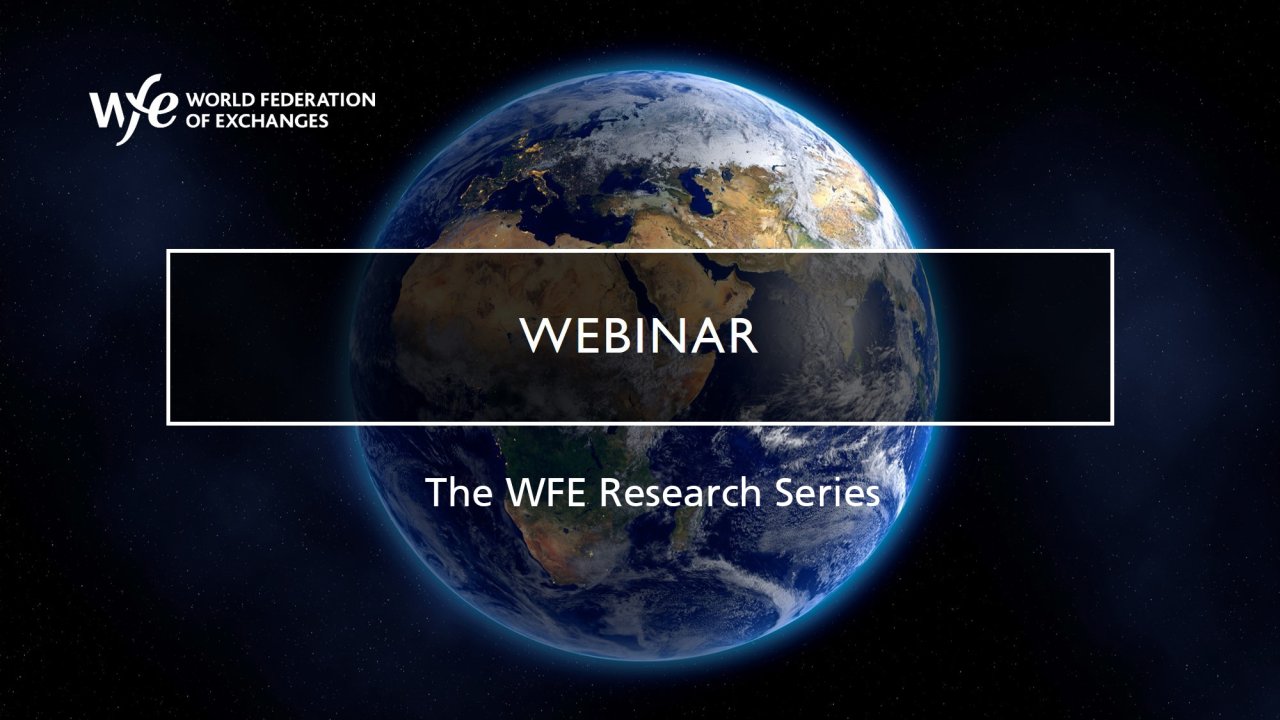WFE Webinar
Uncovering Retail Trading in Bitcoin: The Impact of COVID-19 Stimulus Checks

Introduction: Nandini Sukumar, CEO, The World Federation of Exchanges
Moderator: Pedro Gurrola-Perez, Head of Research, The World Federation of Exchanges
Presenter: Peter Zimmerman, Research Economist, Federal Reserve Bank of Cleveland
Abstract: In April 2020, the US government sent economic impact payments (EIPs) directly to households, as part of its measures to address the COVID-19 pandemic.
We characterize these stimulus checks as a wealth shock for households and examine their effect on retail trading in Bitcoin. We find a significant increase in Bitcoin buy trades. Moreover, the rise in Bitcoin trading is highest among individuals without families and at exchanges catering to nonprofessional investors. We repeat our analysis for other countries with similar stimulus programs and find an increase in Bitcoin buy trades in these currencies. Our findings highlight how wealth shocks affect retail trading.
Format: There will be a presentation followed by an audience Q&A session.
This is a WFE-members and Affiliates only event. Feel free to share with colleagues in your organisation who may be interested.
Please note that all webinars/conferences are recorded and will be available for the WFE members in the members’ area of the WFE website.
Nandini Sukumar is the Chief Executive Officer of the World Federation of Exchanges, the global association for exchanges and CCPs. The WFE represents more than 250 exchanges and clearing houses globally, educating stakeholders on the vital role played by market infrastructures in the real economy and as a standard setter, finding the consensus on issues among the global membership. Of its members, 35% are in Asia-Pacific, 45% in EMEA and 20% in the Americas. WFE exchanges are home to 47,919 listed companies, and the market capitalisation of these entities is over $109 trillion; around $137 trillion (EOB) in trading annually passes through WFE members (at end 2020). WFE’s 57 member CCPs collectively ensure that risk takers post some $800bn (equivalent) of resources to back their positions, in the form of initial margin and default fund requirements. Ms. Sukumar is Vice Chair of IOSCO’s Affiliate Members Consultative Committee and Chair of the AMCC’s Sustainability Taskforce.
Pedro joined the World Federation of Exchanges in October 2019 from the Bank of England, where he led the Financial Market Infrastructures Directorate’s Research Team. He had joined the Bank of England in 2013, after two years at the UK Financial Services Authority. Previously, Pedro spent more than 15 years lecturing and doing research at a range of well-regarded academic institutions, including the University of Barcelona and the Instituto Tecnológico Autónomo de México (ITAM).
Pedro holds two PhDs: one from the University of Barcelona, Spain, and one from the University of Montpellier, France, and has published across key academic journals, including the Journal of Financial Market Infrastructures, the Journal of Risk, International Finance and the Journal of Futures Markets. His recent work includes research on the economics of distributed ledger technologies (DLT) for securities settlement, on the network structure of settlement fails and on market liquidity risk in CCPs. He has also published research on payment systems, back-testing methodologies and on the structure of interest rate futures markets. In 2007 he received the National Award on Derivatives Research, awarded by the Mexican Derivatives Exchange (MexDer).
Peter Zimmerman is a research economist in the Research Department at the Federal Reserve Bank of Cleveland. His research interests are in financial market infrastructure and banking. Recently, he has focused on fintech and issues around cryptocurrencies as payments instruments.
Prior to joining the Bank in 2020, Dr. Zimmerman was a senior economist at the Bank of England. He worked on research and policy issues around the Basel 3 banking reforms, payments systems, shadow banking, and macroprudential policy.
Dr. Zimmerman received his PhD in financial economics from Saïd Business School at the University of Oxford. He holds a BA in mathematics from the University of Cambridge, and an MSc in economics from Trinity College Dublin.